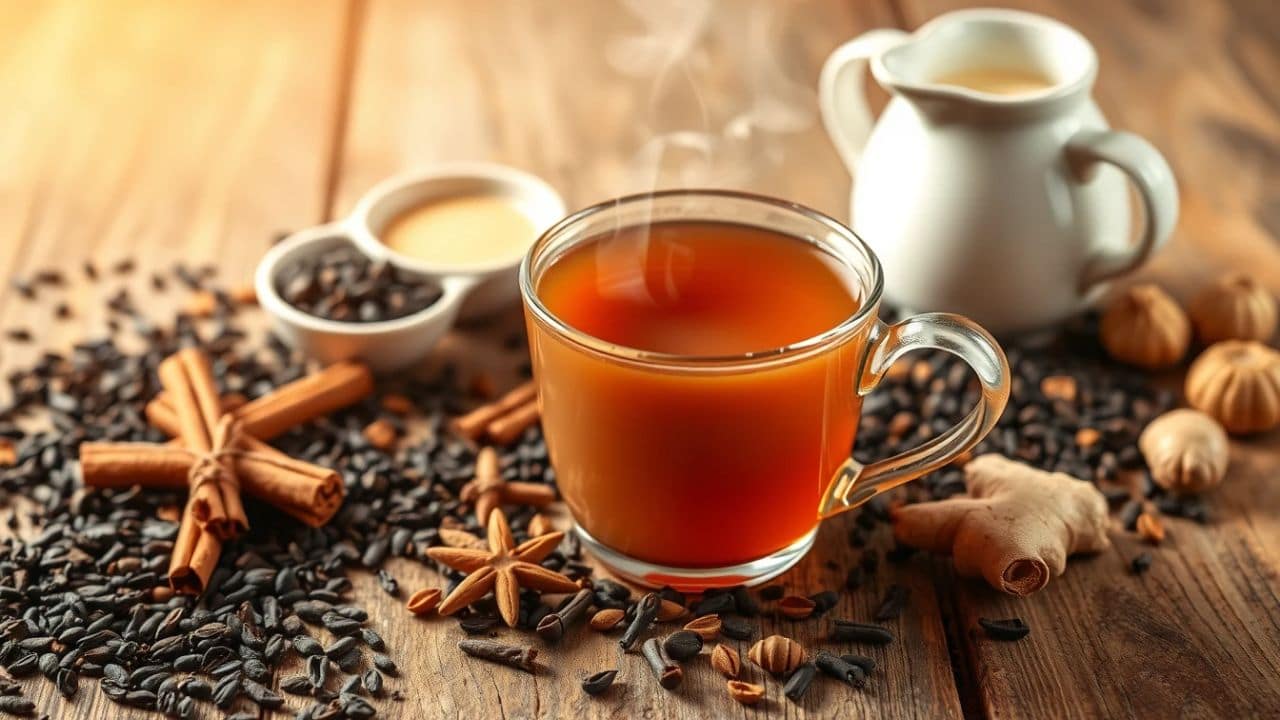Written By: Sherry Harris
Understanding the caffeine content helps you know whether chai fits into your morning routine, your evening relaxation ritual, or even your overall wellness goals. And in this guide, we’re breaking down does chai tea have caffeine? step by step so you can understand chai like never before.
Table of Contents
What Exactly Is Chai Tea?
Chai tea is a flavorful blend traditionally made with black tea, milk, sugar, and a mix of warming spices. These spices typically include ginger, cloves, cinnamon, cardamom, and black pepper. Originating from India, chai has become a beloved drink across the globe.
People love chai because it feels comforting, aromatic, and soothing. The mix of spices gives it a rich flavor that stands out from regular tea. Plus, it’s a beverage you can enjoy hot or iced, making it perfect for any season.
Does Chai Tea Contain Caffeine?
Yes, chai tea does contain caffeine because its base is usually black tea, which naturally has caffeine. The exact amount can vary depending on the type of tea leaves, the blend, and how long it’s brewed. Most cups of chai contain anywhere from 20 to 60 milligrams of caffeine, which is noticeably less than a typical cup of coffee.
Even though chai has caffeine, it delivers a much smoother and calmer energy boost thanks to the spices like ginger, cinnamon, and cardamom. These spices help balance the effects of caffeine, making chai a great option for those who want gentle alertness without the jittery feeling that coffee often brings.
How Much Caffeine Is in Chai Tea?
The caffeine in chai tea varies depending on how it’s prepared. Most cups range between 20–60 mg of caffeine per serving.
Loose-Leaf Chai
Loose-leaf chai typically contains 30–60 mg of caffeine per cup because it uses larger, fresher tea leaves. These leaves release caffeine gradually during brewing, creating a balanced energy boost. The final caffeine content depends on how long you steep the tea and the strength of the blend.
Chai Tea Bags
Chai tea bags usually deliver around 20–40 mg of caffeine per serving. Since tea bags contain smaller, broken tea leaves, they release caffeine faster during steeping. However, because the tea quantity is smaller, the overall caffeine level stays moderate.
Chai Tea Lattes
Chai lattes—especially those made from concentrates—often contain 30–70 mg of caffeine per cup. The caffeine amount depends on how strong the concentrate is and how much milk is added. Café-style lattes may have slightly more caffeine because they use more concentrate per serving.
| Type of Chai Tea | Approx. Caffeine per Cup |
|---|---|
| Loose-Leaf Chai | 30–60 mg |
| Chai Tea Bags | 20–40 mg |
| Chai Tea Lattes (Concentrates) | 30–70 mg |
| Decaf Chai | 2–5 mg |
| Herbal “Chai-Inspired” Blends | 0 mg |
Do You Know?
>> Does Hibiscus Tea have Caffeine?
>> Does Earl Grey Tea Have Caffeine?
How to Brew the Perfect Cup of Chai
Ingredients Needed
To make an authentic cup of chai, you’ll need black tea leaves or chai tea bags, a mix of spices like ginger, cardamom, cinnamon, and cloves. You’ll also need water, milk, and a sweetener such as sugar or honey. These simple ingredients come together to create the warm, flavorful richness chai is known for.
Preparation Guide
Toast the Spices
Lightly toasting whole spices in a dry pan for 30–60 seconds enhances their aroma and deepens flavor. Be careful not to burn them — you want fragrant warmth, not char. Toasted spices make the chai taste richer and more complex.
Simmer Spices in Water
Place the spices and water in a saucepan and bring it to a gentle simmer to extract the flavors. Simmering for 5–10 minutes lets the spices release oils and builds the chai’s spicy backbone. Keep the heat low enough to avoid vigorous boiling, which can make the blend bitter.
Add Tea Leaves
Add your black tea leaves or tea bags to the spiced water and let them steep for 2–5 minutes depending on desired strength. Shorter steeping gives a lighter cup; longer steeping produces a bolder, more caffeinated brew. Taste as you go to hit the balance you prefer.
Add Milk and Sweetener
Pour in cold milk (dairy or plant-based) and add your chosen sweetener, then raise the heat until the mixture just reaches a gentle boil. Simmer for 1–3 minutes so the milk warms through and melds with the tea and spices. Adjust sweetness to taste — chai often benefits from a bit more sugar than plain tea.
Brief Boil & Reduce
Let the chai come to a brief boil to fully marry flavors, then lower the heat and simmer for another 30–60 seconds to concentrate the taste. Watch carefully; milk can foam and overflow quickly. Reducing slightly intensifies the chai without making it bitter.
Strain and Serve
Use a fine mesh strainer to remove tea leaves and spice solids into cups or a teapot for a smooth pour. Serve hot, optionally topped with a pinch of ground cinnamon or a drop of vanilla for extra aroma. Enjoy immediately for the best flavor — chai tastes brightest when fresh.
What Determines the Caffeine Content in Chai Tea?
Type of Black Tea Used
The type of black tea used in chai plays a major role in determining caffeine content. Teas like Assam tend to have higher caffeine levels, while Darjeeling may contain slightly less. The stronger the base tea, the more caffeine your chai will naturally have.
Brewing Time & Water Temperature
The longer you steep chai tea, the more caffeine is extracted from the leaves. Hotter water pulls out caffeine faster, increasing the strength of your cup. Shorter brewing times and lower temperatures result in milder caffeine levels.
Ratio of Tea Leaves to Milk/Water
A higher ratio of tea leaves to liquid will naturally increase caffeine content. When more milk or water is added, the caffeine becomes diluted, reducing its impact. Stronger brews use more leaves, producing a more energizing chai.
Spices and Blends That Affect Strength
While spices themselves don’t contain caffeine, some blends can make the tea feel stronger. Heavier spice mixes enhance the boldness, creating the impression of a more powerful cup. The blend of spices can influence your perception of caffeine even if the amount stays the same.
Best Caffeine-Free Chai Alternatives
Rooibos Chai
Rooibos chai is naturally caffeine-free and made from South African red bush leaves. It offers a smooth, earthy flavor that pairs perfectly with warm chai spices. This makes it an excellent option for nighttime or for anyone avoiding caffeine completely.
Honeybush Chai
Honeybush chai comes from a plant related to rooibos and has a naturally sweet, honey-like taste. When blended with spices, it creates a comforting and mellow chai-like drink. Since it contains no caffeine, it’s ideal for relaxation or late-evening sipping.
Spiced Herbal Blends
Spiced herbal blends use ingredients like cinnamon, clove, ginger, cardamom, and fennel without any tea leaves. These blends mimic the classic chai flavor while remaining 100% caffeine-free. They are perfect for people who want the warmth of chai without any stimulating effects.
| Alternatives | Caffeine Content |
|---|---|
| Rooibos Chai | 0 mg |
| Honeybush Chai | 0 mg |
| Spiced Herbal Blends | 0 mg |
Do You Know?
>> Does Barley Tea Have Caffeine?
>> Which Teas Have the Most Caffeine?
Health Benefits of Chai Tea
Antioxidants–Rich
Chai tea is rich in antioxidants thanks to its black tea base, which helps fight free radicals in the body. These antioxidants can support overall health by reducing oxidative stress and lowering the risk of chronic diseases. Regular consumption of chai may contribute to a stronger immune system and better cellular health.
Supports Digestion
The spices in chai, particularly ginger and black pepper, help stimulate digestion and reduce bloating. Drinking chai after meals can soothe the stomach and promote smoother digestive processes. This makes it a traditional remedy for discomfort and digestive imbalance.
Anti-Inflammatory
Cinnamon, cloves, and cardamom in chai contain natural anti-inflammatory compounds. These spices may help reduce inflammation in the body and support joint and heart health. Regular intake of chai can contribute to managing mild inflammation naturally.
Reduce Stress
The warm aroma and spices in chai have calming effects that can help reduce stress and anxiety. Sipping a cup of chai creates a comforting ritual that promotes relaxation. This makes it a great beverage for unwinding after a busy day or during moments of tension.
Side Effects of Chai Tea
While chai tea is generally safe, drinking too much can lead to side effects due to its caffeine content, such as jitters, increased heart rate, or trouble sleeping. Store-bought or café versions often contain added sugar, which may impact blood sugar levels and overall health. Additionally, some people may experience stomach discomfort or sensitivity from the strong spices used in chai blends.
Is Chai Tea Safe During Pregnancy?
Chai tea is generally safe during pregnancy as long as caffeine intake stays within the recommended daily limit of 200 mg. Since a typical cup of chai contains 20–60 mg of caffeine, moderate consumption—usually one cup a day—is considered safe. It’s important to avoid highly concentrated chai or multiple servings to prevent exceeding the caffeine limit.
Herbal Chai Alternatives
Herbal chai blends made from ingredients like rooibos, honeybush, cinnamon, or ginger contain no caffeine, making them excellent pregnancy-friendly options. These blends offer the same warm, spiced flavor without affecting daily caffeine intake. Choosing herbal chai allows expecting mothers to enjoy chai’s comfort anytime without health concerns.
Conclusion
Chai tea does contain caffeine, but generally in much smaller amounts than coffee, making it a great option for those who want a gentle energy boost. Its combination of black tea and warming spices creates a flavorful, aromatic beverage that is both comforting and invigorating.
For those sensitive to caffeine or looking to avoid it, there are plenty of herbal or decaffeinated chai alternatives that still deliver the rich, spicy flavor. Whether you enjoy traditional masala chai, a chai latte, or a caffeine-free blend, there’s a perfect cup of chai for every occasion.
Frequently Asked Questions
Q. Does chai tea have more caffeine than coffee?
No, chai tea contains significantly less caffeine than coffee. A typical cup of chai has around 20–60 mg of caffeine, while coffee usually contains 90–120 mg per cup. This makes chai a gentler alternative for those who want mild stimulation.
Q. Can I drink chai tea at night?
Drinking regular chai at night may affect sleep because of its caffeine content. Opting for decaf or herbal chai blends allows you to enjoy the flavor without disrupting rest. Herbal options like rooibos or honeybush are completely caffeine-free.
Q. Is chai tea good for digestion?
Yes, chai tea can support digestion thanks to spices like ginger, cardamom, and black pepper. These ingredients help soothe the stomach and improve digestive function. Drinking chai after meals can reduce bloating and discomfort.
Q. Does chai tea help with stress?
Yes, the warm spices and aroma of chai have a calming effect on the mind. Sipping a cup of chai can create a comforting ritual that reduces tension. Its soothing qualities make it a popular beverage for relaxation.
Q. Can chai tea be caffeine-free?
Absolutely, caffeine-free versions of chai exist using herbal blends like rooibos, honeybush, or spiced herbal mixes. These alternatives maintain the classic chai flavor without any caffeine. They are perfect for evenings or for those sensitive to caffeine.

